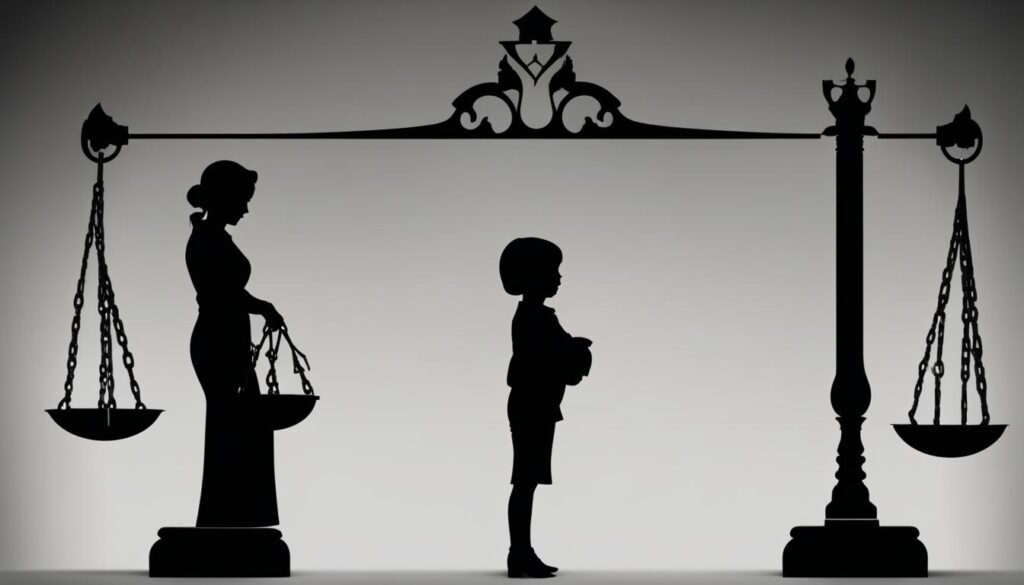Welcome to my comprehensive guide to family law. In this guide, I will provide you with an in-depth understanding of family law and its significance in navigating legal matters that impact families. From marriage and divorce to child custody and adoption, family law covers a wide range of legal issues that are crucial to the well-being of individuals and families alike. By gaining knowledge about family law, you will be empowered to make informed decisions and seek the necessary legal assistance when needed.
Key Takeaways:
- Family law encompasses various legal matters related to family relationships and domestic issues.
- It addresses issues such as marriage, divorce, child custody, adoption, and spousal support.
- Understanding family law empowers individuals to make informed decisions and seek appropriate legal assistance.
- By gaining knowledge about family law, individuals can protect their rights and interests.
- Family law services are crucial in navigating legal matters that impact families.
Introduction to Family Law
In this section, I will provide an introduction to family law, exploring its significance in addressing legal issues that impact families. Understanding family law is essential for individuals who find themselves navigating complex legal situations within the family dynamic. By gaining knowledge of this field, individuals can make informed decisions and seek appropriate legal assistance to protect their rights and interests.
The Essence of Family Law Services
Family law services encompass a range of legal support provided to individuals and families facing family-related legal issues. Family law attorneys play a vital role in offering guidance, representing clients, and navigating legal processes such as divorce, child custody, adoption, and more. They are well-versed in the legal intricacies of family matters and strive to ensure the best outcome for their clients.
Why Knowledge of Family Legal Issues is Crucial
Having a solid understanding of family legal issues is crucial because it empowers individuals to make informed decisions and take appropriate action to protect their rights and the well-being of their loved ones. By understanding family law, individuals can navigate legal processes effectively, address complex issues such as child custody and support, property division, and spousal support, and ensure the best possible outcomes for their families.
Furthermore, knowledge of family legal issues allows individuals to collaborate effectively with their attorneys, providing them with the necessary information and insight to build a strong case and achieve favorable results. It also enables individuals to actively participate in negotiations and make informed decisions that align with their best interests and the best interests of their family members involved in legal matters.
Marriage, Divorce, and Legal Separation
This section will focus on the legal aspects of marriage, divorce, and legal separation. We will delve into the legal requirements for marriage, including marriage licenses and prenuptial agreements. Furthermore, we will discuss the processes and considerations involved in divorce proceedings, including property division, spousal support, and child custody. Lastly, we will explore legal separation as an alternative to divorce and the implications it has on the legal rights and obligations of spouses.

Marriage is a legal union between two individuals, and it comes with certain rights and responsibilities. In order to be legally recognized, marriage requires a marriage license, which is obtained through an application process. Additionally, couples may choose to enter into a prenuptial agreement, which outlines how assets, property, and other matters will be handled in the event of a divorce.
When a marriage ends, the legal process of divorce comes into play. Divorce involves the dissolution of the marriage and requires a court proceeding. During the divorce process, assets and property accumulated during the marriage may be divided between the spouses. The issues of spousal support and child custody are also addressed, ensuring that both parties are treated fairly and the best interests of any children involved are taken into account.
Legal separation, on the other hand, is an alternative to divorce. It allows couples to live separately while remaining legally married. During a legal separation, couples often work out agreements regarding property division, spousal support, and child custody. While a legal separation does not dissolve the marriage, it can provide a period of reflection and space for couples to decide on the future of their relationship.
The Role of a Divorce Attorney in Property Division
In the process of divorce, one of the key areas that require careful consideration is property division. This is where a divorce attorney plays a crucial role in ensuring a fair and equitable distribution of assets between the parties involved. By leveraging their expertise and experience, a divorce attorney can guide their clients through the complexities of property division and protect their interests.
Asset Appraisal and Division Strategies
Prior to dividing marital assets, it is crucial to determine their value through a process called asset appraisal. A divorce attorney is well-versed in this aspect and can utilize various methods such as financial analysis, expert opinions, and professional appraisals to accurately assess the value of different assets.
Once the assets have been appraised, a divorce attorney can employ effective division strategies. These strategies take into account factors such as the financial needs of each party, the duration of the marriage, and the specific laws governing property division in the relevant jurisdiction. Through careful negotiation and advocacy, a divorce attorney can work towards achieving a fair and favorable outcome for their client.
Understanding Equitable Distribution
In many states, property division follows the principle of equitable distribution. This means that assets are divided in a manner that is fair and just, taking into consideration various factors such as the contributions of each party during the marriage and their respective needs.
A divorce attorney is familiar with the legal principles of equitable distribution and can help their clients understand how these principles apply to their specific case. By providing expert guidance, a divorce attorney ensures that their client’s rights are protected throughout the property division process.
Overall, the role of a divorce attorney in property division is crucial for ensuring a fair and equitable distribution of assets. From asset appraisal to division strategies and a deep understanding of equitable distribution, a skilled divorce attorney can navigate the complexities of property division and advocate for their client’s best interests.
Child Custody and Support: A Child Custody Lawyer’s Perspective
In this section, I will provide insights into child custody and support from the perspective of a child custody lawyer. As a legal professional specializing in family law, I have extensive experience in helping parents navigate the complex process of determining child custody and ensuring adequate financial support for their children.

When it comes to child custody, the court’s primary consideration is always the best interests of the child. Various factors are taken into account, including the child’s age, emotional and physical well-being, and the ability of each parent to provide a nurturing and stable environment. As a child custody lawyer, I work closely with parents to compile evidence and present a strong case that supports their suitability as custodial parents.
Child support is another crucial aspect to address when discussing child custody. It ensures that a child’s financial needs are met and prevents one parent from shouldering an unfair burden. Child support is determined based on several factors, such as the incomes of both parents, the custody arrangement, and the child’s needs. As a child custody lawyer, I guide parents through the process of calculating child support and advocate for a fair and equitable arrangement.
Whether you are going through a divorce or a separation, child custody and support are vital elements to consider. Consulting a child custody lawyer can provide you with the legal expertise and guidance necessary to protect the well-being of your children and ensure their financial security. With my knowledge of family law and experience in child custody cases, I am dedicated to helping parents navigate these challenging times and achieve the best possible outcomes for their families.
Exploring Spousal Support with a Spousal Support Lawyer
In this section, I will delve into the topic of spousal support, also known as alimony, from the perspective of a spousal support lawyer. Understanding the intricacies of spousal support is essential for individuals going through a divorce or separation.
One of the key aspects of spousal support is calculating alimony. Several factors come into play when determining the amount and duration of spousal support. These factors may include the income of both parties, the length of the marriage, the standard of living during the marriage, and the financial needs of the receiving spouse.
Calculating alimony can be a complex process as it involves assessing various financial aspects. A skilled spousal support lawyer can help navigate the complexities and ensure a fair and reasonable outcome. By taking into account all relevant factors, a spousal support lawyer can advocate for a favorable alimony arrangement that considers the financial stability and needs of both parties.
It’s important to note that spousal support arrangements are not set in stone. Changes in circumstances can necessitate modifications to the original spousal support agreement. These modifications may be sought if there are substantial changes in income, financial needs, or other relevant factors. Seeking guidance from a spousal support lawyer is crucial when it comes to understanding the implications of spousal support modifications and navigating the legal process.
The image above illustrates the concept of spousal support, providing a visual representation of the topic.
Overall, exploring spousal support with a knowledgeable spousal support lawyer is essential in understanding the complexities of alimony, calculating fair arrangements, and ensuring long-term financial stability.
Adoption Procedures and the Role of an Adoption Attorney
In the process of adoption, it is important to understand the legal requirements and procedures involved. From the initial application to the finalization of the adoption, various steps must be followed to ensure a smooth and successful adoption journey. This is where the role of an adoption attorney becomes crucial.
An adoption attorney specializes in the intricacies of adoption law and provides legal guidance and representation throughout the adoption process. Their expertise helps prospective adoptive parents navigate the complexities of adoption and ensures compliance with all legal requirements.
Adoption procedures may vary depending on the type of adoption (domestic, international, agency, private), but generally involve steps such as:
- Completing the adoption application and obtaining necessary documentation
- Undergoing a home study to assess the suitability of the adoptive parents and their home environment
- Attending adoption education and training sessions
- Matching with a child or being placed on a waitlist
- Meeting the child and establishing a relationship
- Completing legal paperwork and filing the necessary documents
- Attending court hearings and finalizing the adoption
Throughout these procedures, an adoption attorney plays a pivotal role in ensuring compliance with legal requirements and representing the best interests of the prospective adoptive parents and the child being adopted.
By engaging the services of an adoption attorney, individuals or couples looking to adopt can benefit from:
- Legal expertise and guidance throughout the adoption process
- Assistance with paperwork, filing, and ensuring compliance with legal requirements
- Representation in court hearings and legal proceedings
- Advocacy for the rights and interests of the adoptive parents and the child
- Knowledge of adoption laws and regulations specific to the jurisdiction
Having an experienced adoption attorney by your side can provide peace of mind and ensure that the adoption process is handled smoothly and efficiently. They can help navigate any challenges or obstacles that may arise, allowing you to focus on building a loving and nurturing home for your adopted child.

Navigating Family Law Matters with Domestic Violence
In this section, we will address the intersection of family law matters with domestic violence. Domestic violence is a pervasive issue that affects individuals and families, causing emotional, physical, and psychological harm. It is crucial to understand the legal protections and support available for victims of domestic violence to ensure their safety and well-being within the family law system.
Legal Protections and Support for Victims
Victims of domestic violence have legal protections and support mechanisms in place to help them break free from abusive relationships. One vital tool is the issuance of restraining orders, which serve to legally restrict the abuser from having contact with the victim. Restraining orders can provide a sense of security and play a critical role in ensuring the safety of the victim and any children involved.
Assistance programs and support networks are also available to help victims of domestic violence. These programs offer a wide range of services, including shelter, counseling, legal advocacy, and access to community resources. By connecting with these support systems, victims can find the help and support they need to escape abusive situations and rebuild their lives.
Impact on Custody and Parenting Time
Domestic violence can have a significant impact on custody and parenting time arrangements when children are involved in a family law case. The court’s primary consideration is always the best interests of the child, and exposure to domestic violence may weigh heavily in determining custody and parenting time.
When domestic violence exists, a court may prioritize the safety of the child and the victim by awarding sole custody, limiting visitation rights, or requiring supervised visitation. These measures aim to protect the child and ensure a safe environment free from violence.
It is essential for victims of domestic violence to work closely with their attorneys to present evidence of the abuse and advocate for their children’s well-being. Through legal representation and the presentation of compelling evidence, victims can strive to secure custody arrangements that prioritize their children’s safety and best interests.
The Role of Parenting Time Attorneys in Visitation Rights
In cases involving child custody, visitation rights play a crucial role in maintaining meaningful relationships between noncustodial parents and their children. Parenting time attorneys specialize in advocating for the visitation rights of noncustodial parents, ensuring that they have appropriate access to their children.
Parenting time attorneys are well-versed in the legal principles and considerations involved in determining visitation schedules. They work closely with their clients to understand their specific circumstances and develop strategies to protect their rights. By leveraging their legal expertise, parenting time attorneys can negotiate visitation arrangements that take into account the best interests of the child while safeguarding the noncustodial parent’s relationship with their child.
These professionals play a vital role in navigating the complexities of visitation rights. They ensure that their clients understand their legal rights and options, guiding them through each step of the process. Whether it’s preparing custody agreements, assisting with visitation modifications, or advocating for their clients’ interests in court, parenting time attorneys provide the necessary legal support to protect parental relationships and promote healthy co-parenting.

In conclusion, parenting time attorneys are essential advocates for noncustodial parents seeking visitation rights. Their role in the legal process is crucial in ensuring that the best interests of the child are met while upholding the rights of the noncustodial parent. By consulting with a parenting time attorney, individuals can navigate the complexities of visitation rights and work towards maintaining strong relationships with their children.
Understanding Prenuptial Agreements and Their Enforcement
In the realm of family law, prenuptial agreements play a crucial role in safeguarding individuals’ rights and assets in the event of divorce. These legally binding contracts are entered into by couples before they get married, outlining the division of property, finances, and other important matters in the event of divorce or separation.
The Legal Nuances of Drafting Prenups
When it comes to drafting prenuptial agreements, there are several legal nuances that must be considered to ensure their validity and enforceability. The requirements and formalities of drafting a prenup may vary depending on the jurisdiction, but some common elements include:
- Full and fair disclosure of assets and debts
- The absence of coercion or duress
- Independent legal representation for both parties
- Adequate time for review and consideration
By taking these legal nuances into account, couples can ensure that their prenuptial agreements are properly drafted and have a stronger chance of being upheld in court.
Challenging and Upholding Prenuptial Agreements
While prenuptial agreements are generally enforceable, there are circumstances where they can be challenged or invalidated. Some common grounds for challenging a prenup include:
- Fraud or misrepresentation
- Coercion or undue influence
- Lack of voluntary consent
- Unconscionability or unfairness
If a party wishes to challenge a prenuptial agreement, they must present evidence supporting their claim and demonstrate that the agreement should not be upheld. Conversely, those seeking to uphold a prenuptial agreement must provide evidence that the agreement was entered into voluntarily, with full understanding of its implications.
Conclusion
In conclusion, understanding family law is crucial when dealing with legal issues that affect families. By having a solid understanding of family law and its various aspects, individuals can make informed decisions and seek the necessary legal assistance. Throughout this comprehensive guide, we have explored the importance of family law services in addressing various legal matters.
Family law encompasses a wide range of topics, including marriage, divorce, child custody, adoption, spousal support, and more. Each of these areas requires careful attention and knowledge to protect the rights and interests of all parties involved. By familiarizing yourself with the legal principles and requirements, you can navigate these matters more effectively.
Seeking the assistance of qualified professionals such as family law attorneys can greatly benefit you in resolving legal matters. They possess the expertise and experience to guide you through complex processes, ensuring that your rights are protected and your voice is heard. With their support, you can navigate challenging situations and achieve the best possible outcome for you and your family.
In conclusion, understanding family law is essential for individuals and families who want to navigate legal matters successfully. By being informed and seeking appropriate legal assistance, you can ensure that your rights are protected, and your family’s well-being is prioritized. Remember, when it comes to family law, knowledge is power.
FAQ
What is family law?
Family law is a legal discipline that deals with matters related to family relationships and domestic issues. It encompasses issues such as marriage, divorce, child custody, adoption, and spousal support.
Why is family law important?
Family law is important because it provides legal recourse and guidance for individuals facing family-related legal issues. It helps protect the rights and interests of individuals involved in marriage, divorce, child custody, and other family matters.
What services do family law attorneys provide?
Family law attorneys provide a range of services, including legal representation and guidance in matters such as divorce, child custody, spousal support, adoption, and domestic violence. They help individuals navigate the legal process and protect their rights.
What are the legal requirements for marriage?
Legal requirements for marriage vary by jurisdiction, but generally involve obtaining a marriage license and meeting certain age and capacity requirements. Prenuptial agreements may also be a consideration for some couples.
What is involved in divorce proceedings?
Divorce proceedings typically involve the division of marital property, determination of child custody and support arrangements, and potentially spousal support. The process may require negotiation, mediation, or litigation, depending on the circumstances.
What is legal separation?
Legal separation is an alternative to divorce where spouses live separately but remain legally married. It addresses issues such as property division, child custody, and support, but does not terminate the marriage.
What is the role of a divorce attorney in property division?
A divorce attorney helps individuals navigate the complexities of property division during divorce proceedings. They assist in asset appraisal, develop division strategies, and ensure a fair distribution of marital assets.
How is child custody determined?
Child custody is determined based on the best interests of the child, considering factors such as the child’s well-being, parental fitness, and ability to provide a nurturing environment. The court may also consider the child’s preferences, if they are of sufficient age and maturity.
What are the factors considered in calculating spousal support?
Factors involved in calculating spousal support, or alimony, vary by jurisdiction but commonly include the duration of the marriage, income and earning capacity of each spouse, financial needs, and standard of living during the marriage.
What is involved in the adoption process?
The adoption process generally involves completing an application, undergoing a home study, attending adoption training, obtaining consent from biological parents, and appearing in court for the finalization of the adoption. An adoption attorney can provide legal guidance and representation throughout the process.
What legal protections are available for victims of domestic violence?
Victims of domestic violence can seek legal protections such as restraining orders, which can prohibit the abusive party from contacting or approaching the victim. Additionally, there are support programs available to provide assistance and resources to victims.
How are visitation rights determined?
Visitation rights are determined based on the best interests of the child and ensuring the noncustodial parent’s access to the child. Parenting time attorneys can advocate for visitation rights, developing visitation schedules and addressing any disputes or challenges that may arise.
What are prenuptial agreements?
Prenuptial agreements are legal contracts entered into by individuals before marriage, outlining the division of assets and potential financial outcomes in the event of divorce. They serve to protect individuals’ rights and assets.
Source Links
- https://thisladyblogs.com/understanding-family-law-a-comprehensive-guide/
- https://www.thorntonesquirelawgroup.com/understanding-child-custody-in-texas-a-comprehensive-guide.html
- https://www.sll.texas.gov/library-resources/collections/digital-collection/?subject-id=402&subject-name=family-law

